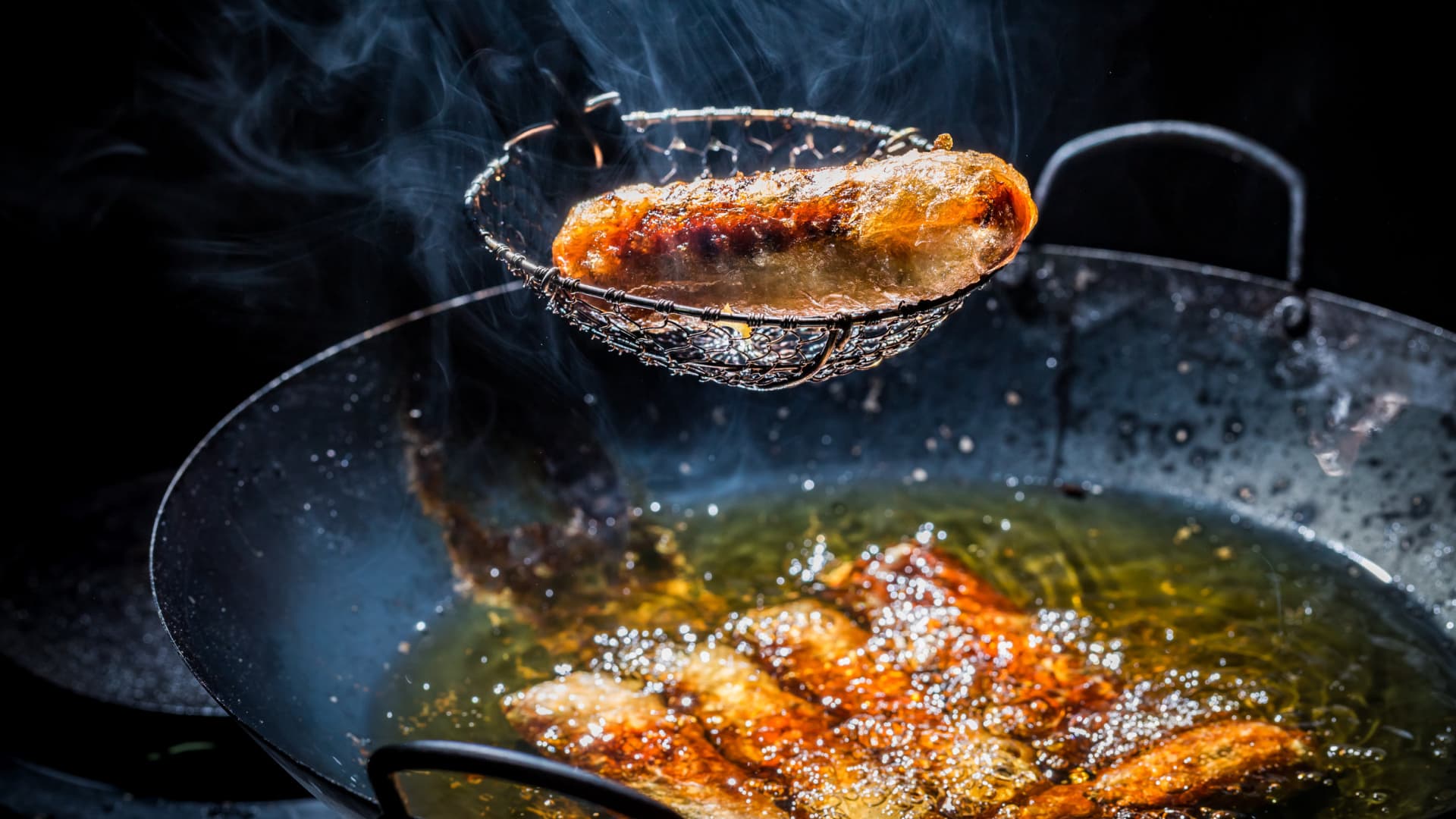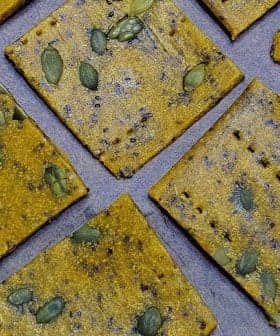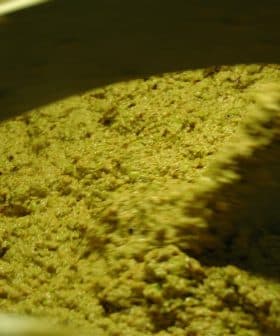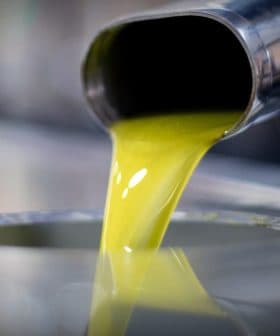Frying in Virgin Olive Oil Adds Healthy Compounds, Researchers Find

New research suggests that deep frying foods like French fries in virgin olive oil can enhance their nutritional content by transferring healthy compounds from the oil to the food. The study found that even after multiple uses, adding fresh olive oil to the fryer can replenish the antioxidants in the oil and continue to benefit the nutritional profile of the fries. Researchers plan to further investigate the effects of deep frying with virgin olive oil on other foods and determine the optimal amount of oil to add to prolong its lifespan and maintain its health benefits.
New research reveals that deep frying certain foods, such as French fries, with virgin olive oil, may enhance their nutritional profile.
According to a new study published in Food Chemistry, during the frying process, some of the healthy properties of virgin olive oil are absorbed by the food.
See Also:Virgin Olive Oils Protect Ready-To-Eat Salads from Some BacteriaSeparate research from the Higher Council for Scientific Research’s (CSIC) fat institute in Spain previously found that food fried in olive pomace oil absorbed some of its healthy compounds as well.
Virgin olive oils are obtained from the fruit of the olive tree with no chemical alteration or heat treatment and differ from extra virgin olive oil due to their higher free acidity levels.
The researchers found that even repeated use of the same virgin olive oils for deep frying would still benefit the fries. After several uses, topping up the fryer with fresh olive oil replenished the frying oil with virgin olive oil’s antioxidants.
“Consequently, part of the composition of this oil will be transferred to the fried food,” Alexandre Guedes Torres, a professor of nutritional biochemistry and food science at the University of Rio de Janeiro, told Olive Oil Times.
“Among the most relevant compounds that were transferred, we saw plant sterols and tocopherols, the intake of which is desirable due to their potential to lower cholesterol and because they present vitamin E activity, respectively,” he added. “Besides these two compounds, other potentially bioactive ones were also transferred to the fries, such as lignans and triterpenic compounds.”
Using analytical chromatography techniques, researchers were able to identify and assess 56 virgin olive oil compounds that would be transferred to food during the drying process.
The researchers’ findings confirmed their hypothesis that some healthy bioactive compounds from virgin olive oils are lost by degradation due to heating the oil. Still, some resist the frying conditions and are transferred to the fried food.
“Our study focused on the changes occurring in the metabolic profile of the virgin olive oil during deep frying,” the researchers wrote. “Our results showed that several of these compounds resist the heat applied, 190 °C, in 30 deep frying cycles of French fries… enriching the fries with bioactive compounds from the virgin olive oil.”
According to the scientists, the research shows that such frying techniques and virgin olive oils might significantly enhance the nutritional profile of fries.
“Virgin olive oil is a nutritionally rich oil,” the researchers wrote. “It adds value to the preparation because it is a source of oleic acid and bioactive compounds, that would not be present nor transferred to the food by employing refined edible vegetable oils commonly used for frying.”
“Thus, we can say that among the choices we have for frying oil, olive oil is possibly one of the most interesting ones due to its appealing nutritional profile,” they added.
The researchers conducted their trials in conditions that mimic home food preparation, where the cooking is done on a small scale, and there is no excessive reuse of the frying olive oil.
See Also:Food & Cooking“Further work is needed to determine if these results will be reproduced under industrial operations,” the researchers wrote. “It seems promising, but we sense that an integrated food science approach would be needed, considering the design of the friers and the overall scale, among other factors that impact heat transfer during deep frying.”
“It would be interesting to see work on industrially deep-fried potatoes, for instance, to check the upper number of consecutive frying operations that could be done before the oil would be considered non-proper,” they added.
In industrial kitchens, researchers plan to investigate “after how many frying cycles would it be best to add small volumes of fresh virgin olive oil, say, near five percent of total oil, to avoid complete depletion of natural antioxidants, and therefore prolong the lifespan of the whole frying medium.”
The composition of olive oil depends on several factors, such as the production region’s climate, altitude, irrigation, soil composition and olives’ ripening.
The research has shown that the higher amount of virgin olive oil metabolites transferred to fries happened using Arbequina.
“The cultivar is another particularly important factor which can influence olive oil composition,” Guedes Torres said. “When we compared Arbequina versus Koroneiki virgin olive oil, the former stood out presenting higher contents of bioactive compounds.”
“Therefore, it is likely that this could be a plausible factor determining the higher contents of such compounds transferred to the fried food, by what we call a mass effect,” he added. “The higher the amount in medium A, the olive oil, the higher the transfer to medium B, the French fries.”
According to the researchers, the beneficial effects of deep-frying with virgin olive oil extend to other food.
“The transfer of the composition of oil used for frying to the food will always occur, as the oil gets absorbed by the food during its preparation,” they wrote. “While frying, a crust is formed on the surface of the food by dehydration on the food surface, and pores are formed by water loss due to heat transfer and increase of inner pressure of the food.”
“These pores allow oil uptake after the food is removed from the oil, regardless of the kind of food being fried,” the researchers added. “But we should consider that this oil uptake will also depend on the food composition.”
Previous research has hinted at the adverse health effects that come from excessive French fry consumption.
Research from the University of Naples in Italy found that potatoes fried for prolonged periods at high temperatures have higher levels of acrylamide, a compound considered toxic and responsible for increasing a person’s cancer risk.
The study had shown that acrylamide levels were lowest in potatoes fried in olive oil and higher in potatoes fried in trans-fat-rich cooking oils.
The researchers said their next steps would be to investigate the evolution of the profile virgin olive oils’ bioactive compounds and the potentially toxic compounds that can form during deep frying if the reuse of the oil is “abusive” and unreasonable.
“Most interestingly, determining what would be this limit of abusive use,” Guedes Torres said. “This limit has been pursued earlier, but the availability of modern high-resolution analytical methods to assess the compounds being formed, and biological assays to assess the toxicity of fried foods, and not only of isolated compounds, should be interesting.”
“Furthermore, the limits of abusive use most likely will vary between oils of different compositions,” he concluded. “Therefore, assessment of varied oils, and not only the most used ones, would be interesting as a means of prospection of promising oils, such as virgin olive oils, in terms of stability during frying and impact on the health of consumers.”









